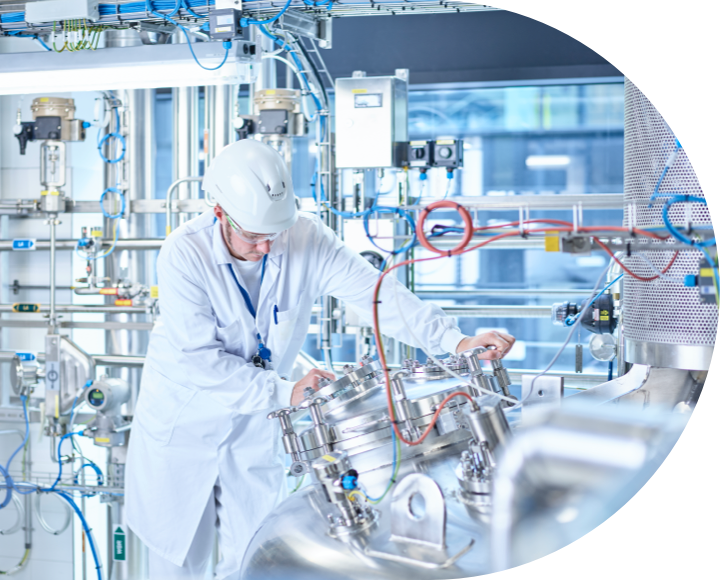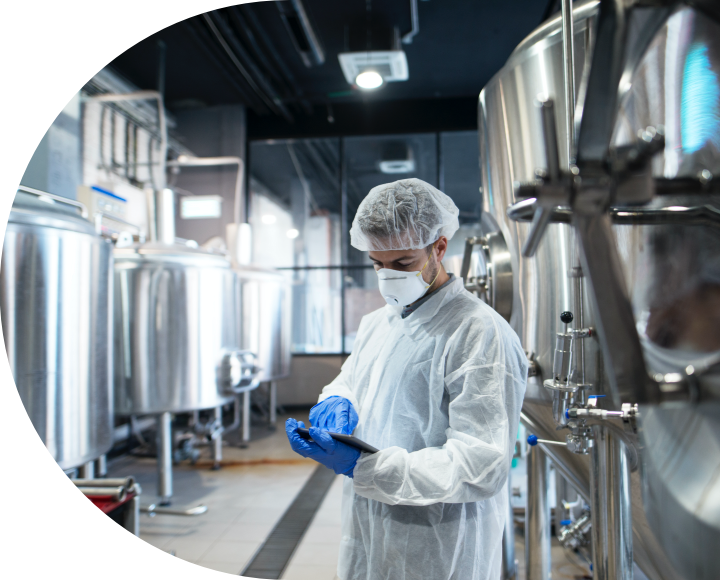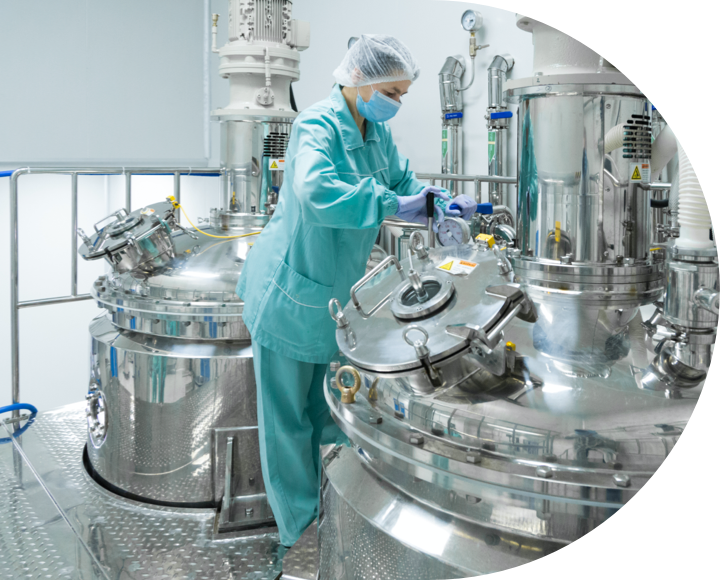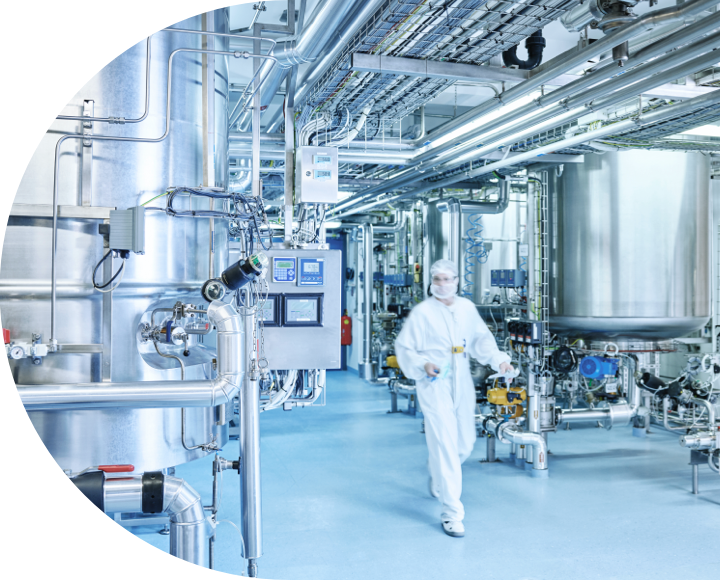- Home
- CDMO Services
- Small Molecules Synthesis C(D)MO
CDMO Services
Small Molecules Synthesis C(D)MO
EUROAPI is able to build on a remarkable heritage in API development and organic synthesis by uniting the chemical expertise of Hoechst-Aventis, Roussel-Uclaf, Chinoin, Genzyme and Sanofi.
As one of the largest API manufacturers in Europe, we aim to be considered an extension of your internal resources and network. EUROAPI will provide a comprehensive CMC service for your drug substance to support your clinical development right up to registration and commercial delivery. Your molecule will benefit from a state-of-the-art development and manufacturing network that can access a powerful technology platform.
More than 250 scientists support our six commercial facilities, offering 2,000 m³ cGMP for organic synthesis and 6,000 m³ for microbial fermentation to produce small molecules. We also enjoy an excellent regulatory and quality track record among global health agencies to support registration and commercial production.
Custom development services
We can provide CMC services to all biopharmaceutical companies, ranging from start-ups to large pharma throughout the life cycle of your product:
Early-stage clinical - Late-stage clinical - Commercial
- Synthetic route definition, analytical development and clinical API batch production, plus the use of modern methodologies such as Quality By Design
- Experienced R&D teams for batch and continuous manufacturing, with proven experience on multi-ton commercial APIs or intermediates

A Center of Excellence
Our small molecules process development center of excellence is located in Budapest, where 150 scientists support all required aspects of clinical API development.
This center is supported by an R&D group focusing on process engineering and flow chemistry based in Frankfurt, and by process industrialization teams in Vertolaye and Frankfurt.

Chemical development
- Organic chemical process development
- Heterocyclic, oligosaccharide chemistry
- Hydrogenation
- Azidation, cyanation, fluorination
- Synthesis of reference standard samples
Analytical development
- Development of analytical methods
- IPC and QC for Pilot Plant: raw materials, intermediates and API
- Structure elucidation
- Solid phase characterization
Process engineering capabilities
- Crystallization
- Filtration, drying and milling
- Distillation (rectification, and short-path)
- Thin film evaporation
Process safety studies
- Process safety investigations
- Calorimetric measurements
- Powder safety studies
- Reaction and reactor simulation
Distillation
- Simple and fractional distillation (10 mbar; 160°C, 1.5 m column)
- Short-path distiller (0.01 mbar and 220°C)
- Chromatography
- Columns: 3 pieces (60 L, 100 L, 200 L) with silica gel feeder
Clean areas for isolation of solid APIs
- Seven separated suites
- Level D (possibility to upgrade to level C)
- API sieving and milling processing area
GMP PILOT PLANT
Equipment
- Scale-up of chemical processes
- Temperature: from -100°C to 250°C
- Reactors: from 60 L to 2500 L. (total: 18 m3)
- Centrifuges: 400 mm, 600 mm, 1000 mm
- Filter-dryers: 0.25 m2, 1.0 m2, 1.5 m2
- Vacuum dryers: 100 L, 500 L, 800 L
- Tray dryers: vacuum-operated
Frankfurt production capability
900 m³ of production capacity
Equipment
-
Reactors up to 20 m3 (SS, GL, Hastelloy)
-
Filtration/drying: various types of filters and dryers
-
High vacuum distillation
-
Low- & high-pressure chromatography (up to 100 bars)
-
Milling, micronization
Special technologies & capabilities
-
Large volume API production unit (up to 1,000 tons)
-
Small and medium API production units (100 kg to 10 tons)
-
Hydrogenation, alkylation
-
Multistep synthesis
-
Heterocyclic chemistry
-
Solid and liquid phase chemistry
FDA, PMDA, and EMA inspected

Vertolaye production capability
550 m³ of production capacity
Equipment
- Reactors: 150 L to 23 m³
- Filtration/Drying
- Centrifuges, various dryers
Special technologies & capabilities
- RSM, intermediates and API production
- Multistep synthesis
- Heterocyclic chemistry
- Steroid chemistry (corticosteroids and hormones)
- Fluorination and cyanation
- Micronization – expertise in jet milling and solid-state properties
EMA and FDA inspected

Budapest production capability
550 m³ of production capacity
Equipment
-
Reactors: O.1to 16 m³ (SS, GL, Hastelloy)
-
Temperature range: -120°C to +220°C
-
Distillation: fractional & high vacuum
-
Filtration/drying: centrifuges, filter dryers
-
Chromatography: low and high pressure
Special technologies & capabilities
- RSM, intermediates, and API production
- Multistep and heterocyclic chemistry
- Tetrazole formation
- Hydrogenation
- Cyanation
- Photobromination
- Prostaglandines (dedicated buildings)
EMA, PMDA, and FDA inspected

Chemistry & special capabilities
Special technologies
- Flow chemistry & continuous manufacturing
- Large-scale chromatography (kilo scale up to 50 mt)
- Difficult reagents
- Fluorination
- Hydrogenation (up to 200 bars)
- Cyanation
- Azides NaN3
- In situ borane (BH3)
- Friedel-crafts
- Cryogenic chemistry
- Methylating agents
- Polymer chemistry (including continuous process)
- Micronization